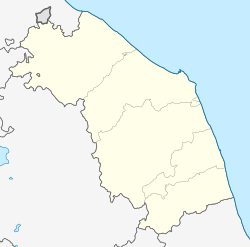Osimo
This article needs additional citations for verification. (November 2022) |
Osimo | |
|---|---|
| Comune di Osimo | |
 Belfry and city hall | |
| Coordinates: 43°29′N 13°29′E / 43.483°N 13.483°E | |
| Country | Italy |
| Region | Marche |
| Province | Ancona (AN) |
| Frazioni | Osimo Stazione, Passatempo, Casenuove, Campocavallo, Padiglione, Abbadia, San Paterniano, Santo Stefano, San Biagio, Santa Paolina |
| Government | |
| • Mayor | Francesco Pirani (Centre-right coalition) |
| Area | |
• Total | 106 km2 (41 sq mi) |
| Elevation | 265 m (869 ft) |
| Population (2018-01-01)[2] | |
• Total | 35,071 |
| • Density | 330/km2 (860/sq mi) |
| Demonym | Osimani |
| Time zone | UTC+1 (CET) |
| • Summer (DST) | UTC+2 (CEST) |
| Postal code | 60027 |
| Dialing code | 071 |
| Patron saint | St. Joseph of Cupertino |
| Saint day | September 18 |
| Website | Official website |
Osimo is a town and comune of the Marche region of Italy, in the province of Ancona. The municipality covers a hilly area located approximately 15 kilometres (9.3 mi) south of the port city of Ancona and the Adriatic Sea.
History
[edit]Vetus Auximum was founded by the same Greek colonists of Ancona; later it was contested by the Gauls and the Picentes until conquered by the Romans, who used it as a fortress for their northern Picenum settlement starting from 174 BCE. The walls were made of large rectangular stones which are still visible in some locations. It was a colony until 157 BCE. The family of Pompey were its protectors and resisted Julius Caesar in 49 BCE. Inscriptions and monuments in its town square attest to the importance of Osimo during imperial times.[3]
In the 6th century it was besieged twice in the course of the Gothic War (535–554) by Belisarius[4] and Totila; the Byzantine historian Procopius said it was the leading town of Picenum.[3]
Osimo was a free commune by 1100 A.D. It was later returned to the Pope by Cardinal Gil de Albornoz. In 1399–1430, it was a fief of the Malatesta family, who built a rocca, or "castle", which is no longer intact. Osimo was again made a part of the Papal States, and remained so until Italian unification in 1861.
Main sights
[edit]This section needs additional citations for verification. (November 2022) |
Osimo retains a portion of its ancient town wall (2nd century BCE). Under the town is a large series of tunnels with esoteric bas-reliefs. The town hall contains a number of statues found on the site of the ancient forum. The new castle (1489), of which parts remain today, was built by Baccio Pontelli.
Among the churches in the town are the following:[5]
- Osimo Cathedral: (8th–12th centuries) The restored Romanesque-Gothic church has a portal with sculptures of the 13th century, an old crypt, a fine bronze font of the 16th century and a series of portraits of all the bishops of the old diocese of Osimo. The baptistery is from the early 17th century and also has a notable baptismal font.
- Basilica of San Giuseppe da Copertino: was founded as a church dedicated to St Francis, but with the canonization in 1753 of Joseph of Cupertino, the church was rededicated and refurbished to house his relics.
- San Marco Evangelista: Erected in 14th century by Augustinian order; refurbished in later centuries, contains an altarpiece by Guercino.
- San Niccolò: 16th-century church
- Sanctuary of the Beata Vergine Addolorata: 20th century Neo-Romanesque church outside of the town center
People
[edit]- Francesco Antonozzi (1685–1741), painter
- Andrea Cionna (born 1968), holder of the world record for the fastest marathon run by a blind man
- Bonfilius (1040–1115), monk, bishop and saint
- Luigi Fagioli (1898–1952), motor racing driver
- Bruno Giacconi (1889–1957), Olympian[6]
- Sylvester Gozzolini, founder of the Sylvestrines and saint
- Clemente da Osimo (1235–1291), Italian Roman Catholic professed religious
Twin towns
[edit]See also
[edit]Notes
[edit]
- ^ "Superficie di Comuni Province e Regioni italiane al 9 ottobre 2011". Italian National Institute of Statistics. Retrieved 16 March 2019.
- ^ Comune di Osimo, project "Prevenzione Sicurezza" in Vivi la città
- ^ a b Ashby 1911.
- ^ Hughes, Ian (Historian) (2009). Belisarius: the last Roman general. Yardley, Pa.: Westholme. ISBN 9781594160851. OCLC 294885267.
- ^ Comune of Osimo. Accessed 29 November 2022.
- ^ "Bruno Giacconi". Sports Reference. Archived from the original on 18 April 2020. Retrieved 18 January 2015.
References
[edit]- This article incorporates text from a publication now in the public domain: Ashby, Thomas (1911). "Auximum". In Chisholm, Hugh (ed.). Encyclopædia Britannica. Vol. 20 (11th ed.). Cambridge University Press. p. 50.
Bibliography
[edit]- Cesare Romiti; Biblioteca comunale e archivio storico (Osimo) (1968). Vicende di Osimo nel medio evo : celebrazione del III centenario della fondazione della Biblioteca 1668 -1968 (in Italian). Ancona: Tipografica Anconitana. p. 33. OCLC 843409959. Archived from the original on August 22, 2019. Retrieved August 25, 2019.



